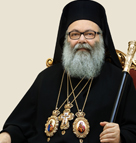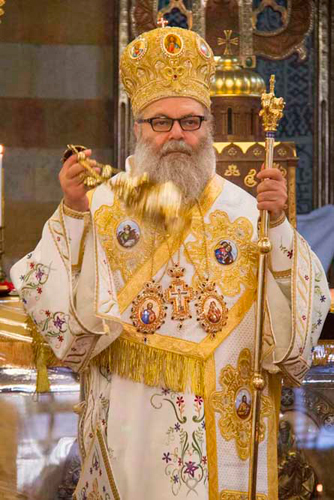The Homily of His Beatitude John X; In the Holy…
 The Homily of His Beatitude John X;
The Homily of His Beatitude John X;
In the Holy Pascha, Damascus, the Mariamite Church 2014
“Christ is risen, and the angels rejoice! Christ is risen, and the demons are fallen! Christ is risen, and not one dead remains in a tomb!”
These words which were preserved in the memory of our Holy Church, are inherited from Saint John Chrysostom, and we read them every year in this holy feast. Your Resurrection, O dear Lord represents joy itself. It represents our victory over death which had dominated our human nature. It represents the disappearance of doubt and the flow of love in the empty spaces of our hearts. It represents passing over time so we may become the children of life, strengthening our anticipation in the middle of this material world. Its purpose is to be in communion with Christ, defeating death and proclaiming those who love Him as the children of eternal life.
We are the children of Resurrection. We find our resurrection through the Cross. We worship Him like the wise men as a Child Who descended to our nature, and we memorize everything about Him in our hearts, as Mary did, till we reach the dawn of Resurrection. We wait Him like Zacchaeus, sit with Him like the sinners, cry over Him like Mary Magdalene waiting the angel at his grave announcing the joyful tidings of His Resurrection. We kiss Him like the children of Jerusalem. We wash our denial to him, like Peter, with the tears of repentance, so we may hear Him saying: ”Peace I leave with you, my peace I give unto you”. Like Mary Magdalene, we wait Him with humility, so we may hear Him calling us with our names after His Resurrection just like her. We contemplate Him like the centurion, stay by His side like Nicodemus, and with the Ramathite we pour our tears over Him. We anoint Him with the ointment of our souls purity like the Myrrh-bearing women. We shout like Thomas: “Let us go and die with Him!” And as weak as him, we abandon Him as well, but later with the hand of Thomas we call Him: “My Lord and My God!”.
 Thomas makes a good example of our human nature, which seeks often, with doubt, the power of God and His work. He is a good example of our human nature which glows with faith in times of peace, but its ember fades in times of tribulation. Before the passion of our Lord, Thomas was one of those who were ready to die with Jesus as the Evangelist John tells us: “Then said Thomas, which is called Didymus, unto his fellow disciples, Let us also go, that we may die with him”. (John 11:16). But after the suffering, we can observe our human weakness reflected through these words: “he said (Thomas) unto them, Except I shall see in his hands the print of the nails, and put my finger into the print of the nails, and thrust my hand into his side, I will not believe” (John 20:25). Who thinks that Thomas lacks faith is totally mistaken. And who thinks that the pride of our human nature, in Thomas, dries the power of his anticipation in Jesus is mistaken as well. For we may face what Thomas faced. We may live soundly, but all of a sudden time changes and we start complaining and telling God: Where are you God? Cannot you see what is happening and the dangers that are surrounding us? Cannot you see the children’s crying, cannot you see all these troubles? Where is your power, O Lord, over sin and darkness? This is what any of us may say in the time of temptation. And that is what happened, as I think, in Thomas’ mind and other disciples. He was not pleased to witness That, Who raises the dead, lying down with them. He was not pleased to witness with his material eyes That Who has had healed the woman which was diseased with an issue of blood, injured, wounded and hanged on a Cross. He has never imagined that The Lord and the Master Who cast out of the temple them who were selling, and Who has been revealed at the river of Jordan, will walk the path of the Cross and death. He has never waited to witness That Who has been crowned with glory in Jordan, to be crowned with thorns at Golgotha. It has never passed in his mind that Jesus, Who has sympathized with the crying woman of Nain raising her son from dead, will be mourned by His mother and the other women, witnessing Him hanged over the Cross.
Thomas makes a good example of our human nature, which seeks often, with doubt, the power of God and His work. He is a good example of our human nature which glows with faith in times of peace, but its ember fades in times of tribulation. Before the passion of our Lord, Thomas was one of those who were ready to die with Jesus as the Evangelist John tells us: “Then said Thomas, which is called Didymus, unto his fellow disciples, Let us also go, that we may die with him”. (John 11:16). But after the suffering, we can observe our human weakness reflected through these words: “he said (Thomas) unto them, Except I shall see in his hands the print of the nails, and put my finger into the print of the nails, and thrust my hand into his side, I will not believe” (John 20:25). Who thinks that Thomas lacks faith is totally mistaken. And who thinks that the pride of our human nature, in Thomas, dries the power of his anticipation in Jesus is mistaken as well. For we may face what Thomas faced. We may live soundly, but all of a sudden time changes and we start complaining and telling God: Where are you God? Cannot you see what is happening and the dangers that are surrounding us? Cannot you see the children’s crying, cannot you see all these troubles? Where is your power, O Lord, over sin and darkness? This is what any of us may say in the time of temptation. And that is what happened, as I think, in Thomas’ mind and other disciples. He was not pleased to witness That, Who raises the dead, lying down with them. He was not pleased to witness with his material eyes That Who has had healed the woman which was diseased with an issue of blood, injured, wounded and hanged on a Cross. He has never imagined that The Lord and the Master Who cast out of the temple them who were selling, and Who has been revealed at the river of Jordan, will walk the path of the Cross and death. He has never waited to witness That Who has been crowned with glory in Jordan, to be crowned with thorns at Golgotha. It has never passed in his mind that Jesus, Who has sympathized with the crying woman of Nain raising her son from dead, will be mourned by His mother and the other women, witnessing Him hanged over the Cross.
But “My thoughts are not your thoughts, neither are your ways my ways, saith the Lord”. (Isaia 55:8). That is why despite his doubt, Thomas, the disciple, became a flame of hope which not even winds can went it out.
The Lord did not leave His creation swinging between doubt and certainty, and He will not. Jesus will not ensconce Himself in the tomb, and He will not stand aside seeing us in the middle of tribulations. Jesus wants us to become the children of Resurrection, He want us to set ourselves free of doubt, touching his life-giving side just like Thomas. How holy is this hand that touched Jesus’ side! How noble is the confession of Thomas: “My Lord and my God!”. With this confession, Thomas, who is called Didymus, teaches us how to preserve our anticipation and how to bury our human doubts in it. And I think that the most beautiful description of Thomas’s confession, was written by Saint Romanus the Melodist saying:
“This confession of faith
Was written for me
By Thomas’ hand, which by touching the Christ;
Became a pen of a ready writer
A pen that explains for the faithful the place from which faith rises.
From Him, the thieve drank and have never got thirsty again;
From Him the disciples filled their hearts;
From Him, Thomas got the knowledge which he was seeking.
He drank first, then he gave the others to drink as well.
He was doubtful for a second, but he convinced the others to cry:
You are our Lord and God”.
Our Savior wants us to cleanse our souls from the dust of our weakness in order to witness Him by our souls’ eyes. He wants us to bury our doubts and complaint in the wounds of His hands to call Him a God and a Lord. He wants us, from the middle of our tribulation to put our anticipation in Him as the Lord of Resurrection Who trampled down death. No matter how difficult the circumstances are, we are called upon to be kneaded with hope, and to be certain that our Lord is with us and that salvation comes from our anticipation in Him. What can describe our feast today better than the words of saint John of Damascus, the son of these suffering lands, who wrote a hymn of Joy for the day of Resurrection mentioning the harsh time and saying:
“Divine and beloved and sweetest utterance of Yours! For You really and truly pledged that You will be with us unto the end of the age, O Christ. And we the faithful, clinging to Your promise, our anchor of hope, rejoice”.
And we trust Christ’s promise. He is the righteous for now and ever.
Christ has risen! He has risen indeed!
